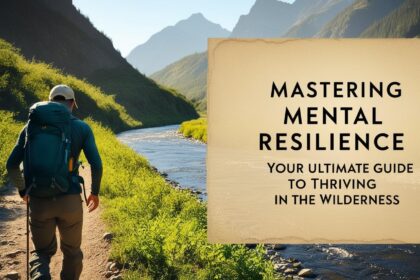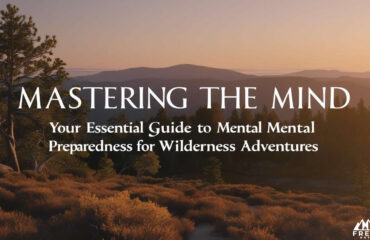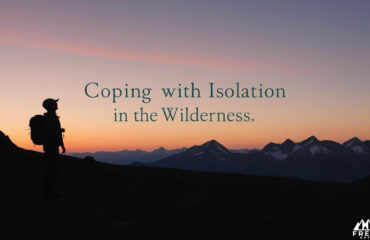
Learn essential techniques and strategies to build mental resilience for successful and safe wilderness exploration.
The Importance of Mental Resilience in Wilderness Exploration
Mental resilience is a critical component for anyone engaging in wilderness exploration, as it often plays a more vital role than physical strength in navigating the unpredictable challenges of the outdoors. In unfamiliar and potentially dangerous environments, individuals must rely on their mental toughness to remain calm and make sound decisions. For example, a hiker who becomes lost in the wilderness must utilize mental resilience to avoid panic and to devise a plan for finding their way back, ultimately enhancing their survival prospects. Studies have shown that those with higher mental resilience are more likely to succeed in outdoor survival situations, as they can effectively handle stress and unexpected obstacles.
Moreover, mental preparedness is essential in wilderness exploration. It can mean the difference between panicking in a crisis and responding with effective problem-solving skills. For instance, during a sudden change in weather conditions, an individual who has mentally prepared for such scenarios is far more likely to make quick, rational decisions that could keep them safe. The ability to maintain composure and think clearly under pressure enhances one’s chances of navigating emergencies effectively, reinforcing the importance of mental resilience in outdoor adventures.
Understanding Mental Resilience
Mental resilience refers to the ability to stay calm and think clearly when faced with challenging situations. It is a skill that can be cultivated through regular exposure to stressors and challenges, which helps individuals adapt to adversity in various forms. For example, someone who frequently engages in challenging outdoor activities, such as rock climbing or long-distance hiking, gradually develops their mental resilience by learning to cope with discomfort and uncertainty. This consistent practice not only builds confidence but also enhances their coping skills for future challenges.
Another critical aspect of mental resilience is emotional regulation, which allows individuals to manage stressors effectively. Learning to recognize and control emotions in high-pressure situations is vital for maintaining a positive mindset. For instance, when faced with fear during a difficult hike, a resilient individual can acknowledge their fear without allowing it to control their actions, enabling them to proceed with caution rather than panic. This ability to self-regulate emotions is essential for success in wilderness exploration.
Techniques for Building Mental Resilience
There are several effective techniques for building mental resilience that outdoor enthusiasts can adopt before embarking on wilderness adventures. One such technique is engaging in realistic survival scenarios, which can significantly enhance cognitive resilience. For example, participating in a wilderness survival workshop that simulates emergency situations can help individuals learn to think critically and act decisively when real-life challenges arise. Additionally, compartmentalizing tasks can reduce stress by breaking down larger challenges into manageable parts, making them less overwhelming.
Mindfulness and meditation also play a crucial role in improving focus and maintaining calmness under pressure. Practicing mindfulness techniques while out in nature can help individuals stay grounded and enhance their ability to respond to challenges thoughtfully. For instance, taking a few moments to breathe deeply and focus on the surroundings can help ease anxiety before tackling a steep climb or navigating difficult terrain. Controlled breathing techniques can further aid in maintaining composure during high-stress moments, allowing adventurers to approach challenges with clarity and confidence. Visualization techniques can also prepare the mind for specific challenges, making it easier to face them when they arise.
The Role of Adventure Therapy
Adventure therapy is an innovative approach that integrates physical activities with therapeutic techniques to address mental health challenges, such as anxiety and depression. This method empowers participants to overcome obstacles and cultivate self-worth through nature-based activities, which can be incredibly beneficial for building resilience. For instance, a participant in an adventure therapy program might engage in a challenging outdoor climb that mirrors their internal struggles, helping them confront and process emotions while developing coping strategies.
Wilderness therapy programs aim to improve resilience and self-esteem by immersing individuals in natural settings where they can explore their emotions and develop important life skills. The physical challenges presented in these environments, combined with therapeutic support, allow participants to confront their fears and learn how to communicate effectively within a group setting. This holistic approach to mental health not only fosters individual growth but also promotes teamwork and cooperation, which are essential in outdoor adventures.
Nutrition and Mental Stamina
Nutrition plays a significant role in maintaining mental stamina during outdoor adventures. A balanced diet and proper hydration are essential for sustaining focus and decision-making capabilities in challenging situations. For example, consuming regular meals and snacks while hiking can help maintain energy levels, thereby supporting emotional awareness and motivation. Certain nutrients, such as omega-3 fatty acids and antioxidants, have been linked to improved brain function and mood regulation, which can be critical during strenuous outdoor activities.
Moreover, staying hydrated is crucial, as even mild dehydration can negatively impact cognitive performance and mood. When hiking in rugged landscapes, ensuring adequate water intake can prevent fatigue and help maintain mental sharpness. Thus, planning meals and hydration strategies in advance can significantly enhance an adventurer’s mental resilience and overall performance in the wilderness.
The Impact of Nature on Mental Health
Spending time in wilderness environments has been shown to have profound effects on mental health, reducing symptoms of depression and anxiety while promoting positive emotions. Activities in nature can improve cognitive performance and foster better sleep cycles, which are crucial for maintaining mental resilience during outdoor adventures. For example, engaging in a peaceful hike through a forest can significantly elevate mood and enhance feelings of well-being, providing mental recovery from daily stressors.
Additionally, the awe experienced in natural settings can lead to enhanced life meaning and a reduction in self-focus, which can counteract symptoms of major depressive disorder. Studies indicate that individuals who spend time in green spaces often experience improved attention spans and cognitive functions, further illustrating the therapeutic benefits of nature. Therefore, immersing oneself in wilderness environments not only supports physical health but also serves as a powerful catalyst for improving mental well-being.
Strategies for Managing Fear and Anxiety
Effectively managing fear and anxiety while exploring the wilderness is essential for maintaining mental resilience. Understanding and recognizing fear as a natural response can help differentiate between rational caution and panic. For instance, setting realistic goals during a hike and breaking them into smaller milestones can keep individuals focused and motivated, helping to alleviate anxiety associated with challenging terrains. Celebrating small victories, such as reaching a scenic viewpoint or completing a tough section of the trail, can reinforce a positive mindset and build resilience.
Developing a pre-adventure routine can also help reduce anxiety by creating familiarity and setting expectations for the trip. Engaging in exposure therapy techniques, where individuals gradually face their fears associated with wilderness exploration, can further desensitize them to anxiety-provoking situations. By adopting these strategies, adventurers can enhance their mental preparedness and effectively manage fear during outdoor experiences.
Building a Strong Foundation for Wilderness Exploration
Building mental resilience is a multifaceted process that encompasses practical techniques, adventure therapy, nutrition, and the therapeutic benefits of nature. Preparing mentally is as crucial as physical training for successful wilderness exploration, as it enhances both safety and enjoyment. For instance, incorporating mindfulness practices and nutritional planning into one’s preparation can create a strong foundation for facing the unpredictable challenges of the great outdoors.
The combination of mental preparedness and physical skills significantly increases the likelihood of a safe and enjoyable outdoor experience. By focusing on building resilience, outdoor enthusiasts can navigate challenges with confidence, ultimately leading to more rewarding and fulfilling adventures in the wilderness.




